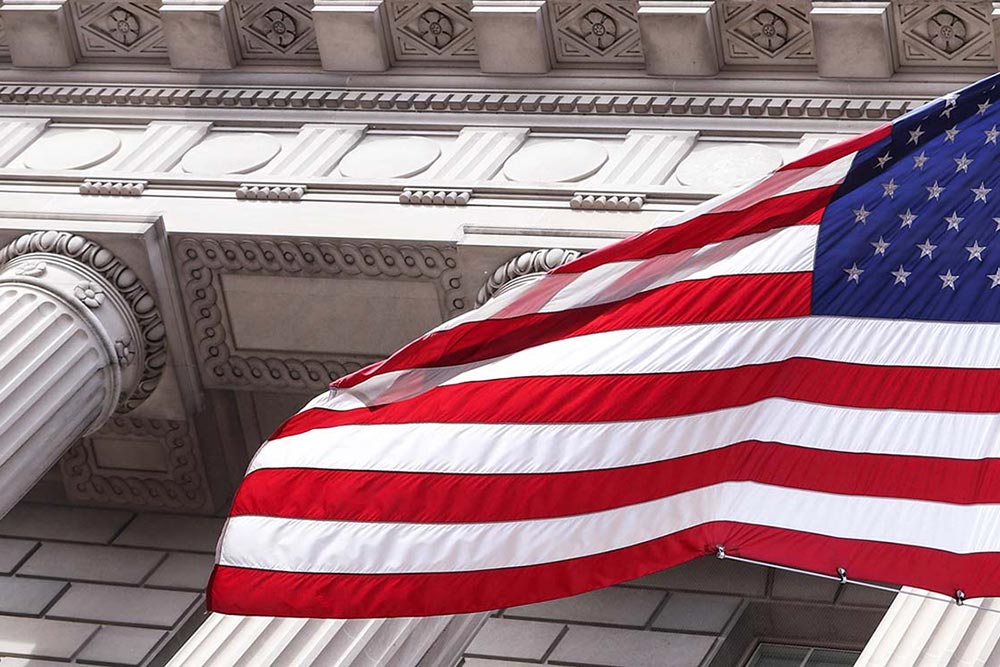On 13 November, Fair Trade Music board members, Rick Carnes and Eddie Schwartz met with the United States Copyright Office in their roles as SGA President and MCNA President respectively. They were joined by SCL president, Ashley Irwin and by Fair Trade Music board adviser and SGA Outside Counsel, Charles Sanders who prepared the detailed summary reproduced below.
Re: Summary of the November 13, 2020 Ex-Parte Meeting Between the United States Copyright Office on behalf of the following independent, US-based music creator organizations: the Songwriters Guild of America, Inc. (SGA), the Society of Composers & Lyricists (SCL), and Music Creators North America, Inc. (MCNA) – Docket Number 2020-12.
On Friday, November 13, 2020, an ex-parte video-conference meeting was conducted by the United States Copyright Office (USCO) with multiple interested parties concerning rulemakings in connection with Doc. No. 2020-12. This summary is submitted on behalf of SGA, SCL and MCNA (together, the “Independent Music Creator Organizations” or “IMCOs”), all of which were represented at the meeting. Attending for SGA were President Rick Carnes, outside counsel Charles Sanders, and outside legislative consultant Marla Grossman of the American Continental Group (ACG). Attending for SCL was President Ashley Irwin. Attending for MCNA was President Eddie Schwartz. The meeting was chaired on behalf of the USCO delegation by its General Counsel, Regan Smith.
Individuals representing the IMCOs began by respectfully stressing, as they had in their ex parte tele-conference with the USCO on September 11, 2020, the bedrock principle that independent music creators speak for themselves on all issues related to their rights and interests, and that no other music community groups have the right or authority to claim otherwise. Specifically, the IMCOs rejected the assertion by some music publisher representatives (backed by at least one of their affiliated songwriter groups) that the USCO’s oversight and rulemaking authority concerning matters related to 2020-12 should be viewed as being narrowly limited.
The IMCOs have stressed on multiple occasions through their USCO Comments a strong belief that Congress, by its very construction of the Music Modernization Act (MMA), intends the Office to have broad and expansive authority to oversee and guide the implementation of the MMA by the Mechanical Licensing Collective (MLC). That is especially so in regard to ensuring transparency, reliability and fairness regarding the safeguarding of music creator rights, the class of persons for whom the MMA was most clearly enacted to protect pursuant to Article I Section 8 of the US Constitution.
The main issue of concern addressed at the November 13, 2020 meeting was the oversight and disposition of accrued, unmatched royalties collected and held by Digital Music Providers and subsequently distributed pursuant to private negotiated agreements with music publishers. It is believed by the IMCOs that as regards those agreements and royalties, some or all of the parties thereto were very likely aware at the time of negotiation and execution, that (i) such confidential agreements and payments concerned royalties accrued from the unauthorized reproduction or distribution of musical works owned by unrelated third parties; (ii) little to no effort had been made to properly identify rightful ownership, and (iii) such accruals might soon be subject to payment rules under the MMA that would require strictly delineated sharing of such “permanently” unmatched royalties with music creators by music publishers (including a minimum floor of 50%) after the conducting by the MLC of bona fide searches for rightful owners.
Further assertions were made by the IMCOs at the meeting that after three years of discussions, still no informed estimate had yet been made by Digital Music Providers of the aggregate amounts of unmatched royalties both still being held and already distributed. Thereafter, one knowledgeable representative of Digital Music Providers estimated that while there remain hundreds of millions of dollars in accrued, unmatched royalties in the possession of the Digital Music Providers, tens of millions of dollars in accrued unmatched royalties were indeed turned over directly to music publishers pursuant to the terms of the confidential, private negotiated agreements.
As was also made clear during the meeting, the IMCOs have no direct information as to the content of such private negotiated agreements, and no direct information as to what became of the unmatched royalties such music publishers received.
Several music publishers have claimed in ex parte letters to the USCO that they indeed shared such unmatched royalties with their affiliated music creators, but no specific information has been provided as to the methodology and details of such sharing, including whether the principles and and guarantees eventually set forth in the MMA as enacted were applied1. Moreover as the IMCOs reported at the meeting, an informal and ongoing process of canvassing creators currently being conducted by each MCNA member organization have yet to confirm a single instance in which a songwriter or composer received a royalty statement indicating that portions of such accrued, unmatched royalties were included (though they may have been) and on what basis.
As the IMCOs asserted at the meeting, were such unmatched royalties paid to songwriters and composers by music publishers on terms resembling the MMA rules concerning music creator protections (as either drafted or eventually enacted), it seems counter-intuitive that that no line item would appear anywhere in accounting statements indicating the source of such payments, not only as a matter of sound accounting practice, but of earned good will. No other music creator groups present at the meeting challenged or contradicted these ongoing findings or assertions. In any event, as noted, it seems that the burden of demonstrating the details of such payments is more properly placed on the music publishers who claim to have made them, which could be as simple as each publisher disclosing a properly predicated and binding assertion that the payments were made, how many were made, what was the aggregate payment, and how was each songwriter’s share determined2.
Under such circumstances as they currently exist, as SGA President Rick Carnes pointed out at the meeting, asking interested parties to render opinions on the minutiae of proposed rules concerning the disposition of accrued unmatched royalties –with only some parties having an understanding of how the private agreements operated, who got paid, who didn’t, and why– is a difficult position in which to place the IMCOs and other parties with important, related interests.
As Mr. Carnes pointed out, the issues of (i) how to protect the rights of those music creators and copyright owners who did not participate in the privately negotiated agreements by ensuring that there is an opportunity to actually match those already-distributed royalties to their proper owners and to effect the prompt payment of such sums, (ii) how to balance accounts once such proper identifications have been made, while also ensuring that affiliated music creators have been properly paid by their music publishers concerning royalties collected under the private negotiated agreements that otherwise would have flowed through the MLC and been explicitly subject to MMA distribution requirements, (iii) how to address demands of Digital Music Providers that they not be made to pay twice for the same unmatched uses, and (iv) how to ensure that such private negotiated agreements are not utilized in the future in attempts to override the provisions of the MMA, all need to be addressed prior to a proper analysis of how most effectively to move forward3.
Thus, as was stated at the meeting, while the IMCOs agree the MMA makes clear that ALL accrued unmatched royalties for unauthorized reproductions and distributions dating back to inception must be turned over to the MLC by Digital Music Providers, and that the term “generally accepted accounting principles” used in the Act in no way provides an exception to that unambiguous provision, the crucial questions enumerated above also need to be immediately addressed as matters of fairness and transparency mandated by the Act.
As to the very important issue of retroactive effect of the MMA provisions concerning guaranteed music creator participation in the distribution of permanently unmatched royalties at or above the fifty percent level, the IMCOs adamantly believe, as stated at the meeting, that it is wholly illogical for any interested party to argue that Congress intended as it did to require that all accrued, unmatched royalties be rendered to the MLC by Digital Music Providers back to each service’s date of inception, but that the songwriter, composer, transparency and good faith protections guaranteed by the Act would not otherwise be applicable in the event of premature disgorgement of unmatched royalties by Digital Music Providers to music publishers pursuant to prior agreements. This is an issue that certainly requires further attention, and calls for more comprehensive discussion than for which there was time at the meeting.
As was noted several times by various speakers, the Chair of the Senate Judiciary has warned that absent a fair and transparent resolution of these complex issues, the MMA may become a magnet for litigation, the very opposite effect that it was intended to achieve. The IMCOs wholeheartedly agree, and stand ready to assist the USCO in taking all reasonable measures to achieve the transparency, fairness and robust oversight that the legislation demands in order to avoid that undesirable result.
To reiterate in closing, as the IMCOs tried to make clear at the meeting, voluntary disclosure of the specific details of the privately negotiated agreements, redacted to protect legitimate privacy and antitrust concerns, is an important prerequisite to achieving those goals. The IMCOs further repeat their stated beliefs that the USCO has the singular ability if not to compel, at least to facilitate such disclosures in a timely manner, and respectfully urge it to do so.
Further comments of SGA, SCL and MCNA will be forthcoming in regard to the proposed rulemaking by next week’s deadline. As stated at the conclusion of the meeting, however, the IMCOs believe that all parties would benefit by a brief extension for the submissions of such comments until the Monday after the Thanksgiving holiday in order to allow for further discussions among the parties. The IMCOs acknowledge a certain lack of unified support for this suggestion at the meeting, and active opposition by at least one music publisher representative, but continue to believe it to be an advisable accommodation. Those parties wishing to abide by the original deadline would always be free to do so, as was explicitly pointed out.
The IMCOs thank the USCO for scheduling the ex parte discussion, and look forward to continuing this constructive dialog.
Respectfully submitted,
Charles J. Sanders
Outside Counsel, Songwriters Guild of America, Inc.
cc:
Regan Smith, General Counsel, The United States Copyright Office
Rick Carnes, SGA President
Ashley Irwin, SCL President
Eddie Schwartz, MCNA President
Footnotes:
1. At least one publisher has indicated an alleged willingness to share details of such payments with any writer who makes inquiry as to his or her own works, an unlikely scenario considering that a huge percentage of writers have no knowledge of the private negotiated agreements in the first place, and –to the knowledge of the IMCOs based on informal canvassing– have not been directly informed about them by their publishers. See, e.g., Ex Parte letter from Sony/ATV dated October 28, 2020: “It has been SATV’s practice to explain to our writers who inquire how these royalties are distributed and reflected on their statements.”
2. Likewise, it seems that the burden of demonstrating how much each Digital Music Provider paid to music publishers is more properly placed on the services who claim to have made the payments, which in turn could be as simple as disclosing a properly predicated and binding assertion that the payments were made, how many were made, what was the aggregate payment, and how was each publisher’s share determined. It is anticipated that such details may be forthcoming from Digital Music Providers in their reporting under the MMA, but that remains uncertain.
3. That is especially so in light of the apparent assertions of one or more Digital Music Providers that they may forego the limited safe harbor provisions provided by the MMA by not turning over to the MLC the full amount of accrued, unmatched royalties dating back to inception of use, probably under the assumption that the potential running of applicable statutes of limitations will provide the same protections as the safe harbor without payment of the royalties due. The IMCO raised this statute of limitations issue at the meeting, and was gratified that at least one Digital Music Provider representative felt that this was an issue worthy of further discussion, hopefully with the important input of the USCO. See also, related comment of DLC that “…a DMP could make the rational choice to forego the payment of accrued royalties entirely, and save that money to use in defending itself against any infringement suits.” Comments Of Digital Licensee Coordinator, Inc. In Response To Notice Of Proposed Rulemaking , Docket 2020-12, Document COLC 2020-0011-0008 (Aug. 17, 2020) at 4.


